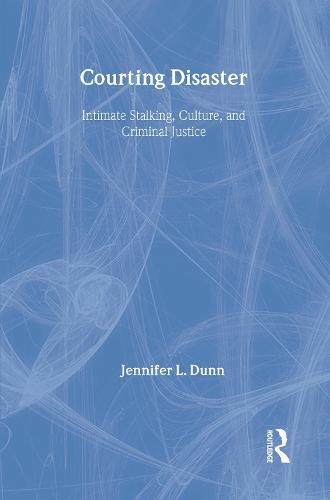Full Product Details
Author: Jennifer L Dunn
Publisher: Taylor & Francis Inc
Imprint: AldineTransaction
Dimensions:
Width: 15.20cm
, Height: 2.00cm
, Length: 22.90cm
Weight: 0.430kg
ISBN: 9780202306612
ISBN 10: 0202306615
Pages: 204
Publication Date: 30 September 2002
Audience:
College/higher education
,
Professional and scholarly
,
Undergraduate
,
Postgraduate, Research & Scholarly
Format: Hardback
Publisher's Status: Active
Availability: In Print

This item will be ordered in for you from one of our suppliers. Upon receipt, we will promptly dispatch it out to you. For in store availability, please contact us.
Reviews
<p> Dunn's analysis of the challenges women encounter as they seek help while simultaneously living with the experience of stalking reveals the inadequacy of current criminal justice interventions. In an intriguing analysis of how victims do emotion work in their interactions with stalkers, Dunn shows that victims sometimes temporarily comply with their stalkers' demands to feel safe or because they are convinced by their former partners' professions of love. At other times, they avoid interactions or fight back. <p> --Kristin L. Anderson, Gender and Society <p> Stalking behavior has only recently been defined as deviant behavior. With the passage of the first anti-stalking statute in 1990, stalking became illegal, and researchers began to examine the nature of and criminological motivations behind stalking... [This book] provides useful information on stalking and its victims and convincing critiques that suggest various ways in which law enforcement practitioners could improve their understanding of stalking and better deal with the problems that might stem from traumatic situations in legal processing... The book is well organized and includes thought-provoking pictures. <p> --Jungmi Kim, Contemporary Sociology <p> In Courting Disaster, Jennifer Dunn demonstrates that the constructionist perspective can be fruitful and can provide insights for both addressing real-world policy problems and grappling with theoretical issues. And she shows us that it is possible to be simultaneously an advocate for a cause and a serious, sophisticated social scientist with a passion for finding out how things work. <p> --Erich Goode, Symbolic Interaction
Dunn's analysis of the challenges women encounter as they seek help while simultaneously living with the experience of stalking reveals the inadequacy of current criminal justice interventions. In an intriguing analysis of how victims do emotion work in their interactions with stalkers, Dunn shows that victims sometimes temporarily comply with their stalkers' demands to feel safe or because they are convinced by their former partners' professions of love. At other times, they avoid interactions or fight back. --Kristin L. Anderson, Gender and Society Stalking behavior has only recently been defined as deviant behavior. With the passage of the first anti-stalking statute in 1990, stalking became illegal, and researchers began to examine the nature of and criminological motivations behind stalking... [This book] provides useful information on stalking and its victims and convincing critiques that suggest various ways in which law enforcement practitioners could improve their understanding of stalking and better deal with the problems that might stem from traumatic situations in legal processing... The book is well organized and includes thought-provoking pictures. --Jungmi Kim, Contemporary Sociology In Courting Disaster, Jennifer Dunn demonstrates that the constructionist perspective can be fruitful and can provide insights for both addressing real-world policy problems and grappling with theoretical issues. And she shows us that it is possible to be simultaneously an advocate for a cause and a serious, sophisticated social scientist with a passion for finding out how things work. --Erich Goode, Symbolic Interaction
Author Information
Jennifer Dunn (University Of Illinois, Urbana)




